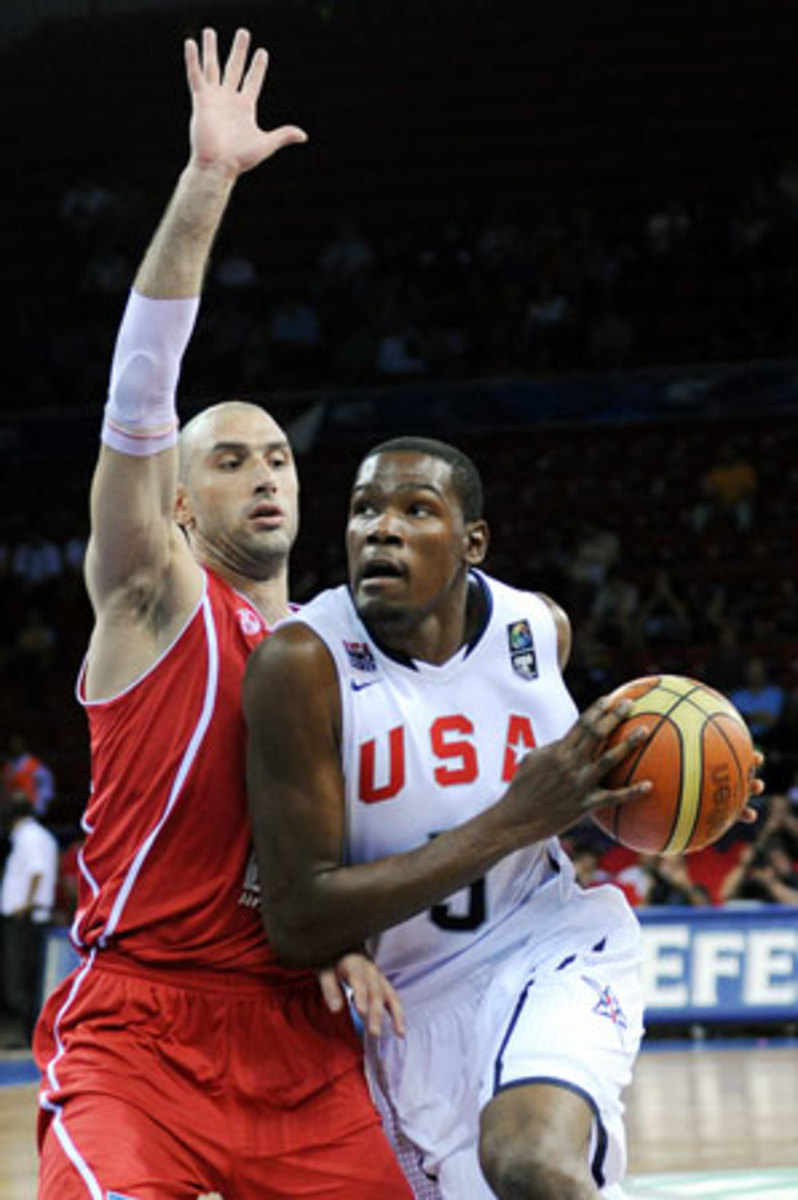This isn't 1992: Team USA still faces hurdles along road to gold
It's why they raise their eyebrows when the U.S. can only eke out a six-point lead against Iran in the first quarter and scratch their heads when Tunisia -- population 10.3 million -- closes to within two points late in the first half. It's why they can't be fully satisfied when it takes an errant jump shot to stave off overtime against Brazil.
But the days of U.S. dominance are long over. It was a hard lesson learned in 2002, when the U.S. limped to an embarrassing sixth-place finish at the FIBA World Championship. We learned it again in '04 and had it repeated in '06, when teams of U.S. stars fell short of Olympic and world championship gold. Sure, the U.S. regained it's top-dog status in 2008, when the Redeem Team struck gold at the Beijing Olympics, but there isn't a soul affiliated with that group that would describe that process as anything other than grueling.
The globalization of the game has leveled the playing field. Victory can still be achieved but it will take a total team effort to do it. This U.S. squad appears to understand that. The 2010 version of Team USA has its requisite star in KevinDurant (a team high 17.8 points per game), but its perfect 5-0 record in Group play can be more attributed to its ability to find an identity, one that has been formed from its depth at every position.
Derrick Rose (8.4 points) and Russell Westbrook (8.2) have sparked a prolific transition game while Eric Gordon -- an afterthought coming out of training camp -- has emerged as the team's most dangerous three-point shooter (11-for-24 from beyond the arc). Andre Iguodala has emerged as a solid defender, while the troika of Lamar Odom, Kevin Love and Tyson Chandler have effectively plugged up the middle.
Certainly, the U.S. is far from flawless -- a quick shot mentality and occasional defensive lapses still plagues them -- but it is a far better group than the one that first convened in Las Vegas two months ago.
"We're right where we thought we were going to be, or hoped we would be, after pool play," said Chauncey Billups. "We went 5-0 and had pretty good games. You want to be respectful of different countries but at the same time, you want to try to get better a little bit. That's why you see the lapses that we have but I feel like we're in a good spot, a great spot actually."
Indeed, the U.S. has many reasons to be optimistic heading into knockout round. Because while they have improved, it seems some parts of the world have not. Spain was considered to be among the favorites coming into the tournament. But it was beaten by a France team that is without Tony Parker, Joakim Noah and Roddy Beaubois and picked up its second loss by blowing an 18-point lead to Lithuania.
Greece has also stumbled. One of the most experienced teams in the tournament, the Greeks boasted top international talent Sofoklis Schortsanitis, Vassilis Spanoulis and Dimitris Diamantidis. But they were crushed by Turkey and narrowly defeated by Russia.
The end result is that the U.S.' path to the gold medal game has cleared considerably. Team USA will open with Angola and face the winner of Russia and New Zealand in the quarterfinal. On the bottom half of the bracket, Argentina -- the 2004 Olympic champion -- and Brazil will battle it out in the opening round with the winner likely facing a tough test against Lithuania.
Several top contenders can be avoided, too. Serbia, the winner of Group A, is in the opposite bracket. So, too, are Greece, Spain, Australia and Turkey. The Turks, led by Hedo Turkoglu and Ersan Ilyasova, swept through Group C and have been feeding off the support of a rabid home crowd.
One of them will make a formidable opponent for the U.S. in the gold medal game but they will run a brutal gauntlet just to get there. Winning their first world championship gold medal since 1994 won't be easy for the U.S., but the road there suddenly looks significantly less difficult.
"We're still optimistic, still hungry," said Stephen Curry. "[We're] ready to stay focused on the goal."
Luis Scola, F, Argentina. The Houston Rockets forward has stepped into the scoring void created by the absence of Manu Ginobili and Andres Nocioni to average a tournament-high 29 points per game.
Kirk Penney, SG, New Zealand. The ex-Wisconsin star dropped 37 points on Lithuania and is averaging a team-high 25.4 points per game.
Ersan Ilyasova, F, Turkey. One of the NBA's most improved players last season, the versatile Ilyasova (16.5 points, 9.0 rebounds in Group play) has been a nearly impossible matchup for opponents.
Yi Jianlian, PF/C, China. The 7-footer sat out China's finale with an Achilles' injury and will have an MRI this weekend. If he can play, his 22.5 points and tournament-best 9.8 rebounds gives China a punchers chance.
Patrick Mills, PG, Australia. The Aussies are without Andrew Bogut but they still have Mills, the Trail Blazers' blurring point guard who is averaging 14.0 points and 4.4 assists.





